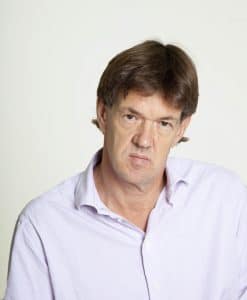Masterclass with…
Robert McCrum, Former literary editor of The Observer, author of Shakespearean (2020)

Telling stories is a weird business, at once a performance and a matter of life and death in which there are few, if any, rules. Traditionally, storytelling is wrapped in mystery. According to St John the evangelist, “In the beginning was the word.” He might as well have written, “Anything Goes.”
In our own nervous and self-conscious times, varieties of storytelling have become college courses, a writing-group standby and a popular means of bite-sized self-expression – as, for example, in this Bridport Prize. But it’s not just about trophies and crowd-pleasing.
However they weave their magic, stories never lose their power to moderate and console extremes of feeling and experience. Since the millennium, many contemporary writers have turned to short fiction to address their intimations of dread, exploring dystopian visions that help to focus our deeper sensations of anxiety about the way we live now.
Rarely have stories seemed more necessary
This year’s Bridport prize marks a post-millennial milestone, coming after a once-in-a-lifetime moment of global history. Rarely have stories seemed more necessary. Rarely have the narrative lines of memoir, fable, and medical reportage offered more consolation to troubled readers and writers. Every creative mind, young and old, has been to the edge of reason and back, having looked into an abyss. Now, with the probable advent of calmer times, it’s my guess that the mystery of story-telling – under the flag of Anything Goes – is about to enter a new phase of creative originality.
Ezra Pound once instructed the aspiring young modernists of his day to Make It New. The storytellers of 2021 do not need that kind of prod. We are all living, or partly living, in a new society. I believe that short-stories, which transistorise the circuit-board of thoughts and feelings are going to flourish during the 2020s as never before.
I’m not going to dish out handy tips about a creative process in which rule-breaking is as important as rule-following. The great short-story writer Ernest Hemingway was onto this is an early letter to his father:
You see I’m trying in all my stories… not just to depict life—but to actually make it alive. When you have read something by me you actually experience the thing. You can’t do this without putting in the bad and the ugly as well as what is beautiful. Because if it is all beautiful, you can’t believe in it. Things aren’t that way. It is only by showing both sides, three dimensions, and if possible, four, that you can write the way I want to.
Be original
So what more will this judge be looking for among the 2021 entries? Well, it’s a lot, and a little. For many years, during the 1980s, as editor-in-chief at Faber & Faber, this was a question that animated my professional life. Talking about writing is not the same as reading or writing it. My answer always involved authorial authority, and the identity of a distinctive point-of-view, from funny to sad. You can go on about the “narrative arc”, or character, location and jeopardy, but that only gets you so far.
Fundamentally, the short-storyteller’s singular obligation, sitting in that circle round the fire, is to be original, to hold her, or his, audience’s attention line by line, from moment to moment. Some of my best discoveries included Lorrie Moore, Kazuo Ishiguro, Hanif Kureishi, Paul Auster and Marilynne Robinson. Even with the benefit of hindsight, I cannot describe what these writers have in common, but whatever it is I recognised it instinctively. It’s what the creative-writing handbooks call a “Voice”.
Robert has written six novels and was literary editor of the Observer for twelve years. He is our 2021 Short Story and Flash Fiction judge.







